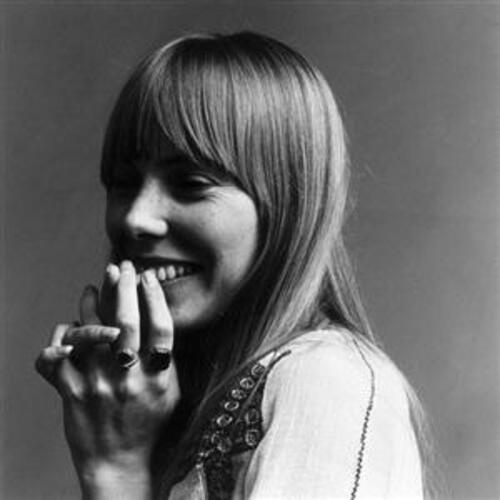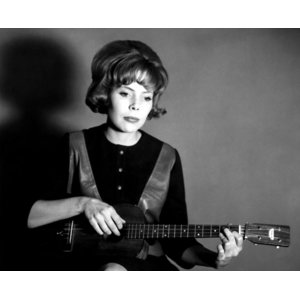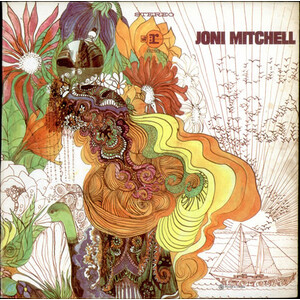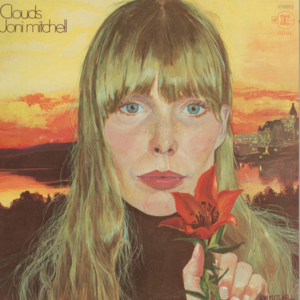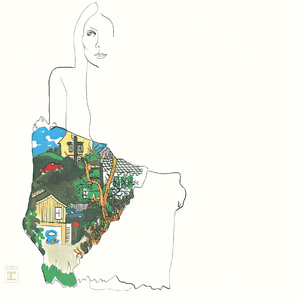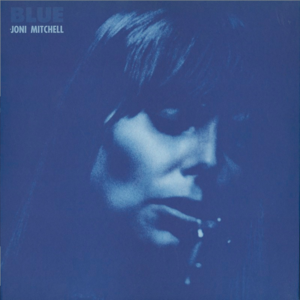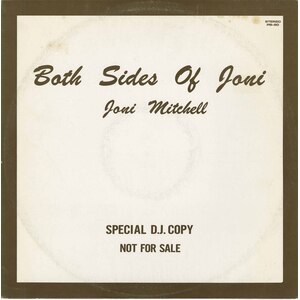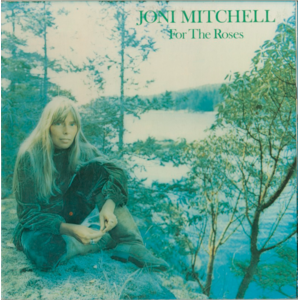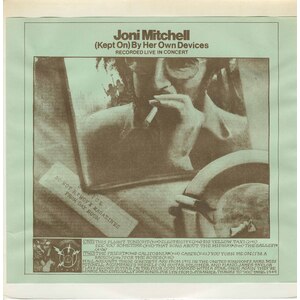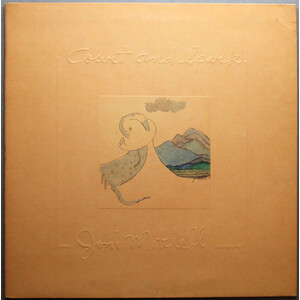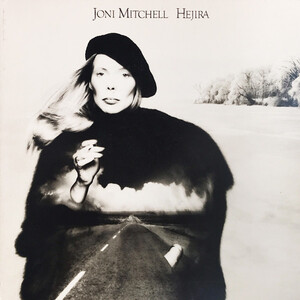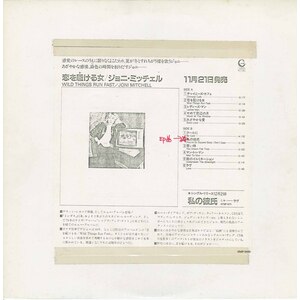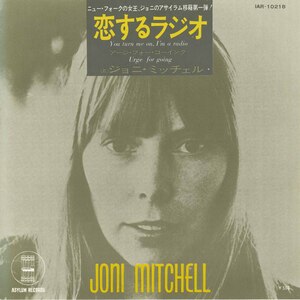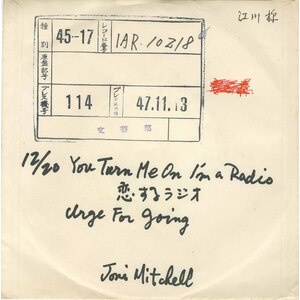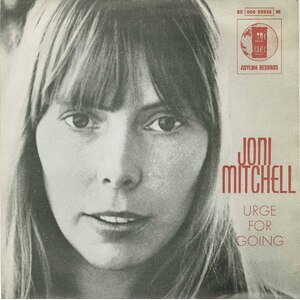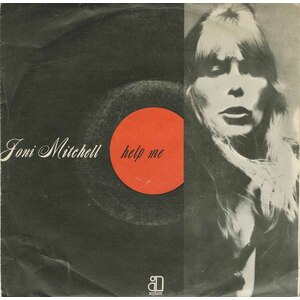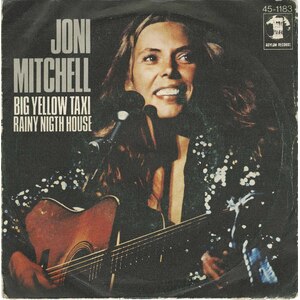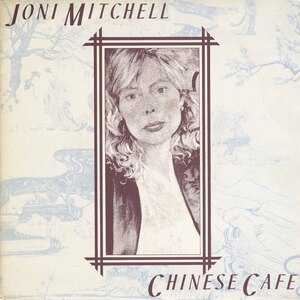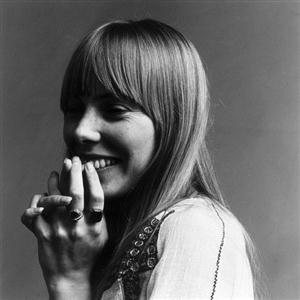Mitchell, Joni
Websites:
http://jonimitchell.com/
Origin:
Fort MacLeod, Alberta → Saskatoon, Saskatchewan, 🇨🇦
Biography:
Joni Mitchell, CC (born Roberta Joan Anderson on November 7, 1943) is a Canadian musician, songwriter, and painter.
Mitchell began singing in small nightclubs in her native Western Canada and then busking on the streets of Toronto. In the mid-1960s she left for New York City and its rich folk music scene, recording her debut album in 1968 and achieving fame first as a songwriter ("Urge for Going", "Chelsea Morning", "Both Sides Now", "Woodstock") and then as a singer in her own right. Finally settling in Southern California, Mitchell played a key part in the folk rock movement then sweeping the musical landscape. Blue, her starkly personal 1971 album, is regarded as one of the strongest and most influential records of the time. Mitchell also had pop hits such as "Big Yellow Taxi", "Free Man in Paris", and "Help Me", the last two from 1974's best-selling Court and Spark.
Mitchell's soprano vocals, distinctive harmonic guitar style, and piano arrangements all grew more complex through the 1970s as she was deeply influenced by jazz, melding it with pop, folk and rock on experimental albums like 1976's Hejira. She worked closely with jazz greats including Wayne Shorter, Jaco Pastorius, Herbie Hancock, and on a 1979 record released after his death, Charles Mingus. From the 1980s on, Mitchell reduced her recording and touring schedule but turned again toward pop, making greater use of synthesizers and direct political protest in her lyrics, which often tackled social and environmental themes alongside romantic and emotional ones.
Mitchell's work is highly respected both by critics and fellow musicians. Rolling Stone magazine called her "one of the greatest songwriters ever," while Allmusic said, "When the dust settles, Joni Mitchell may stand as the most important and influential female recording artist of the late 20th century." By the end of the century, Mitchell had a profound influence on artists in genres ranging from R&B to alternative rock to jazz. Mitchell is also a visual artist. She made the artwork for each of her albums, and in 2000 described herself as a "painter derailed by circumstance." A blunt critic of the music industry, Mitchell had stopped recording over the last several years, focusing more attention on painting, but in 2007 she released Shine, her first album of new songs in nine years.
Joni Mitchell was born Roberta Joan Anderson on November 7, 1943, in Fort Macleod, Alberta, Canada, to Bill Anderson and Myrtle Anderson (n?e McKee). Her mother was a teacher, and her father an officer in the Royal Canadian Air Force. During the war years, she moved with her parents to a number of bases in western Canada. After the war, her father began working as a grocer, and his work took the family to Saskatchewan to the towns of Maidstone and North Battleford. When she was eleven years old, the family settled in Saskatoon, Saskatchewan, which Mitchell considers her hometown.
Her father was of Norwegian background; her mother's maiden name was McKee, so she also claims Scottish and Irish ancestry. Her paternal grandmother was born on the farm Farestveit in Modalen, Hordaland, Norway. Her paternal grandfather was from S?mna, S?r-Helgeland, Nordland, Norway.There was Sami(formerly Lapp) heritage in this side of her family.
At the age of nine, Mitchell contracted polio during a Canadian epidemic, but she recovered after a stay in hospital. It was during this time that she first became interested in singing. She describes her first experience singing while in hospital during the winter in the following way:
"They said I might no walk again, and that I would not be able to go home for Christmas. I wouldn't go for it. So I started to sing Christmas carols and I used to sing them real loud...The boy in the bed next to me, you know, used to complain. And I discovered I was a ham."
She began smoking at the age of nine as well, a habit which is debatably one of the factors contributing to the change in her voice in recent years (Mitchell herself disputes this in several interviews).
As a teenager, Joni taught herself ukulele and, later, guitar. She began performing at parties, which eventually led to busking and gigs playing in coffeehouses and other venues in Saskatoon. After finishing high school at Aden Bowman Collegiate in Saskatoon, she attended the Alberta College of Art and Design in Calgary for a year, during which she made the acquiantance of another budding singer-songwriter, Harry Chapin, but Mitchell then left, telling her mother: ?I'm going to Toronto to be a folksinger.?
After leaving art college in June 1964, Mitchell left her home in Saskatoon to relocate to Toronto. She found out that she was pregnant by her college ex-boyfriend, and in February 1965 she gave birth to a baby girl. A few weeks after the birth, Joni Anderson married folk-singer Chuck Mitchell, and took his surname. A few weeks later she gave her daughter, Kelly Dale Anderson, up for adoption. The experience remained private for most of her career, but she made allusions to it in several songs, most notably a very specific telling of the story in the 1971 song "Little Green". Mitchell's 1982 song "Chinese Cafe", from the album Wild Things Run Fast, includes the lyrics "Your kids are coming up straight / My child's a stranger / I bore her / But I could not raise her".
Mitchell's daughter, renamed Kilauren Gibb, began a search for her as an adult. In 1997 Gibb mentioned her search to the girlfriend of a man with whom she had grown up. By coincidence, this woman knew a third person who had once told her that he knew Joni Mitchell years earlier "when she was pregnant". Mitchell and her daughter were reunited shortly thereafter.
In the summer of 1965, Chuck Mitchell took Joni with him to the United States. While living in Detroit, Chuck & Joni were regular performers at area coffee houses as well as The Alcove bar near Wayne State University. However, the marriage and partnership of Joni & Chuck Mitchell dissolved in a year and a half, in early 1967. Thereafter, Mitchell launched her solo career.
In early 1967 Joni Mitchell moved to New York City to pursue her musical dreams as a solo artist. She played venues up and down the East Coast, including Philadelphia, Boston, and Fort Bragg, North Carolina. She performed frequently in coffeehouses and folk clubs and, by this time creating her own material, became well known for her unique songwriting and her innovative guitar style. Oscar Brand featured her several times on his CBC television program Let's Sing Out in 1965 and 1966, broadening her exposure. Joni attended school at WVU for short period, which led to her song "Morning Morgantown".
Folk singer Tom Rush had met Mitchell in Toronto and was impressed with her songwriting ability. He took "Urge For Going" to popular folk act Judy Collins but she was not interested in the song at the time, so Rush recorded it himself. Country singer George Hamilton IV heard Rush performing it and recorded a hit country version. Other artists who recorded Mitchell songs in the early years were Buffy Sainte-Marie ("The Circle Game"), Dave Van Ronk ("Both Sides Now"), and eventually Judy Collins ("Both Sides Now", a top ten hit, included on her 1967 album Wildflowers). Collins also covered "Chelsea Morning", a recording which again eclipsed Mitchell's own commercial success early on.
While she was playing one night in "The Gaslight South", a club in Cocoanut Grove, Florida, David Crosby walked in and was immediately struck by her ability and her appeal as an artist. He took her back to Los Angeles, where he set about introducing her and her music to his friends. Crosby convinced a record company to agree to let Joni record a solo acoustic album without all the folk-rock overdubs that were in vogue at the time, and his clout earned him a producer's credit in March 1968, when Reprise Records released her debut album, alternately known as Joni Mitchell or Song to a Seagull.
Mitchell continued touring steadily to promote the LP. The tour helped create eager anticipation for Mitchell's second LP, Clouds, which was released in April 1969. It finally contained Mitchell's own versions of some of her songs already recorded and performed by other artists: "Chelsea Morning", "Both Sides Now", and "Tin Angel". The covers of both LPs, including a self-portrait on Clouds, were designed and painted by Mitchell, a marriage of her art and music which she would continue throughout her career.
Mitchell's Court and Spark tour with the LA Express March 5, 1974 Anaheim Convention Center Photo: Matt Gibbons
In March 1970 Clouds won Joni Mitchell her first Grammy Award for Best Folk Performance. The following month, Reprise released her third album, Ladies of the Canyon. Mitchell's sound, still under the guidance of producer Crosby, was already beginning to expand beyond the confines of acoustic folk music and toward pop and rock, with more overdubs, percussion, and backing vocals, and for the first time, many songs composed on piano, which would become a hallmark of Mitchell's style in her most popular era. Her own version of "Woodstock", slower and darker than the Crosby, Stills & Nash cover, was performed on electric piano. The album also included the already-familiar song "The Circle Game" and the environmental anthem "Big Yellow Taxi", with its now-famous line, "they paved paradise and put up a parking lot".
Ladies of the Canyon was an instant smash on FM radio and sold briskly through the summer and fall, eventually becoming Joni's first gold album (selling over a half million copies). Mitchell made a decision to stop touring for a year and just write and paint, yet she was still voted "Top Female Performer" for 1970 by Melody Maker, the UK's leading pop music magazine. The songs she wrote during the months she took off for travel and life experience would appear on her next album, Blue, released in June 1971.
Blue was an almost instant critical and commercial success, peaking in the top 20 in the Billboard Album Charts in September and also hitting the British Top 3. Lushly-produced "Carey" was the single at the time, but musically, other parts of Blue departed further from the sounds of Ladies of the Canyon in favor of simpler, rhythmic acoustic parts allowing a focus on Joni's voice and emotions ("All I Want", "A Case of You"), while others such as "Blue", "River" and "The Last Time I Saw Richard" were sung to her rolling piano accompaniment. In its lyrics, the album was regarded as an inspired culmination of her early work, with depressed assessments of the world around her serving as counterpoint to exuberant expressions of romantic love (for example, in "California"). Mitchell later remarked, "At that period of my life, I had no personal defenses. I felt like a cellophane wrapper on a pack of cigarettes. I felt like I had absolutely no secrets from the world and I couldn't pretend in my life to be strong."
Mitchell made the decision to return to the live stage after the great success of Blue, and she presented many new songs on tour which would appear on her next album. Joni's fifth work, For the Roses, was released in October 1972 and immediately zoomed up the charts. She followed with the single, "You Turn Me On, I'm a Radio", which peaked at #25 in the Billboard Charts in February 1973, becoming her first bonafide hit single. The album was critically acclaimed and earned her success on her own terms, though it was somewhat overshadowed by the success of Blue and by Mitchell's next album.
Court and Spark, released in January 1974, would see Mitchell begin the flirtation with jazz and jazz fusion that marked her experimental period ahead, but it was also her most commercially successful recording, and among her most critically acclaimed. Court and Spark went to #1 on the Cashbox Album Charts. The LP made Joni Mitchell a widely popular act for perhaps the only time in her career, on the strength of popular tracks such as the rocker "Raised on Robbery", which was released right before Christmas 1973, and "Help Me", which was released in March of the following year, and became Joni's only Top 10 single when it peaked at #7 in the first week of June. "Free Man in Paris" was another hit single and staple in her catalog.
While recording Court and Spark, Mitchell had tried to make a clean break with her earlier folk sound, producing the album herself and employing jazz/pop fusion band the L.A. Express as what she called her first real backing group. In February 1974, her tour with the L.A. Express began, and they received rave notices as they traveled across the United States and Canada during the next two months. A series of shows at L.A.'s Universal Amphitheater from August 14-17 were recorded for a live album release. In November, Mitchell released a live album called Miles of Aisles, a two-record set including all but two songs from the L.A. concerts (one selection each from the Berkeley Community Center, on March 2, and the LA Music Center, on March 4, were also included in the set). The live album slowly moved up to #2, matching Court and Sparks's chart peak on Billboard. "Big Yellow Taxi", the live version, was also released as a single and did reasonably well (Mitchell would ultimately release yet another recording of "Big Yellow Taxi" in 2007).
In January 1975, Court and Spark received four nominations for Grammy Awards, including Grammy Award for Album of the Year, for which Mitchell was the only woman nominated. She won only the Grammy Award for Best Instrumental Arrangement Accompanying Vocalist(s)
Joni Mitchell went into the studio in the spring of 1975 to record acoustic demos of some songs she'd written since the Court and Spark tour ended. A few months later she recorded versions of the tunes with her band, which now included saxophonist Wayne Shorter. Mitchell's musical interests now were diverging from both the folk and the pop scene of the era, toward less structured, more jazz-inspired pieces, with a wider range of instruments. On "The Jungle Line", she also made an early effort at sampling a recording of African musicians, something that would become more commonplace among Western rock acts in the 1980s. Meanwhile, "In France They Kiss on Main Street" continued the lush pop sounds of Court and Spark, and efforts such as the title song and "Edith and the Kingpin" chronicled the underbelly of suburban lives in Southern California.
The new song cycle was released in November 1975 as The Hissing of Summer Lawns. The album was initially a big seller, peaking at #4 on the Billboard Album Charts, but it received mixed reviews at the time of its release. A common legend holds that Rolling Stone magazine declared it the "Worst Album of the Year"; in truth, it was called only the year's worst album title. However, Mitchell and Rolling Stone have had a contentious relationship, beginning years earlier when the magazine featured a "tree" illustrating all of Mitchell's alleged romantic partners, primarily other musicians, which the singer said "hurt my feelings terribly at the time". During 1975, Mitchell also participated in several concerts in the Rolling Thunder Revue tours featuring Bob Dylan and Joan Baez, and in 1976 she performed as part of The Last Waltz by The Band. In January 1976, Mitchell received one nomination for the Grammy Award for Best Female Pop Vocal Performance for the album The Hissing of Summer Lawns, though the Grammy went to Linda Ronstadt.
In early 1976, Mitchell traveled with friends who were driving cross country to Maine. Afterwards, Mitchell drove back to California alone and composed several songs during her journey which would feature on her next album, 1976's Hejira. She states, "This album was written mostly while I was traveling in the car. That's why there were no piano songs..." Hejira was arguably Mitchell's most experimental album so far, due to her ongoing collaborations with legendary jazz virtuoso bass guitarist Jaco Pastorius on several songs including the first single, "Coyote", the atmospheric "Hejira", the disorienting, guitar-heavy "Black Crow," and the album's last song "Refuge of the Roads." The album climbed to No. 13 on the Billboard Charts, reaching gold status three weeks after release, and received airplay from album oriented FM rock stations. Yet "Coyote", backed with "Blue Motel Room", failed to chart on the Hot 100. While the album was greeted by many fans and critics as a "return to form", by the time she recorded it her days as a huge pop star were over. However, if Hejira "did not sell as briskly as Mitchell's earlier, more "radio friendly" albums, its stature in her catalogue has grown over the years." Mitchell herself believes the album to be unique. In 2006 she said, "I suppose a lot of people could have written a lot of my other songs, but I feel the songs on Hejira could only have come from me".
In the summer of 1977, Mitchell began work on new recordings, what would become her first double studio album. Close to completing her contract with Asylum Records, Mitchell felt that this album could be looser in feel than any album she'd done in the past and said, "This record followed on the tail of persecution, it's experimental, and it didn't really matter what I did, I just had to fulfill my contract". Don Juan's Reckless Daughter was released in December 1977. The album received mixed reviews but still sold relatively well, peaking at No. 25 in the US and going gold within three months. The cover of the album created its own controversy; Mitchell was featured in several photographs on the cover, including one where she was disguised as a black man (this is a reference to a character in one song on the album). Layered, atmospheric compositions such as "Overture / Cotton Avenue" featured more collaboration with Pastorius, while "Paprika Plains" was a 20-minute epic that stretched the boundaries of pop, owing more to Joni's memories of childhood in Canada and her study of classical music. "Dreamland" and "The Tenth World", featuring Chaka Khan on backing vocals, were percussion dominated tracks. Other songs continued the jazz-rock-folk collisions of Hejira. Mitchell also revived "Jericho", written but never recorded years earlier (a version is found on her 1974 live album).
A few months after the release of Don Juan's Reckless Daughter, Mitchell was contacted by jazz great Charles Mingus, who had heard the orchestrated song, "Paprika Plains", and wanted her to work with him. Mitchell began a collaboration with Mingus, who died before the project was completed in 1979. She finished the tracks (most were her own Mingus-inspired compositions, though "Goodbye Pork Pie Hat" is a Mingus instrumental standard to which Joni composed lyrics) and the resulting album, Mingus, was released in June 1979, though it was poorly received in the press. Fans were confused over such a major change in Mitchell's overall sound, and though the album topped out at No. 17 on the Billboard album charts?a higher placement than Don Juan's Reckless Daughter -- Mingus still fell short of gold status, making it her first album since the 1960s to not sell at least a half-million copies.
Mitchell's summer tour to promote Mingus began in August 1979 in Oklahoma City and concluded six weeks later with five shows at Los Angeles' Greek Theater, where she recorded and filmed the concerts. It was her first tour in several years, and with Pastorius, jazz guitar great Pat Metheny, and other members of her band, Mitchell also performed songs from her other jazz-inspired albums. When the tour ended she began a year of work, turning the tapes from the Los Angeles shows into a two-album set and a concert film, both to be called Shadows and Light. Her final release on Asylum Records and her second live double-album, it was released in September 1980, and made it up to No. 38 on the Billboard Charts. A single from the LP, "Why Do Fools Fall in Love?", Mitchell's duet with The Persuasions (her opening act for the tour), bubbled under on Billboard, just missing the Hot 100.
For a year and a half, Mitchell worked on the tracks for her next album. During this period Mitchell recorded with bassist Larry Klein, eventually marrying him in 1982. While the album was being readied for release, her friend David Geffen, founder of Asylum Records, decided to start a new label, Geffen Records. Still distributed by Warner Bros,, (who controlled Asylum Records), Geffen was able to negate the remaining contractual obligations Mitchell had with Asylum and signed her to his new label. 1982's Wild Things Run Fast marked a return to pop songwriting, including "Chinese Cafe/Unchained Melody", which incorporated the chorus and parts of the melody of the famous Righteous Brothers hit, and "(You're So Square) Baby I Don't Care", a remake of the Elvis chestnut which charted higher than any Mitchell single since her 70s sales peak when it climbed to No. 47 on the charts. The album, however, peaked on the Billboard Charts in its fifth week at only No. 25.
As 1983 began, Mitchell began a world tour, visiting Japan, Australia, Ireland, the United Kingdom, Belgium, France, Germany, Italy, Scandinavia and then back to the United States. A performance from the tour was videotaped and later released on home video (and later DVD) as "Refuge Of The Roads". As 1984 ended, Mitchell was writing new songs, when she had a suggestion from Geffen that perhaps an outside producer with experience in the modern technical arenas they wanted to explore might be a worthy addition. British synth-pop performer and producer Thomas Dolby was brought on board. Of Dolby's role, Mitchell later commented: "I was reluctant when Thomas was suggested because he had been asked to produce the record , and would he consider coming in as just a programmer and a player? So on that level we did have some problems... He may be able to do it faster. He may be able to do it better, but the fact is that it then wouldn't really be my music."
The album that resulted, Dog Eat Dog, released in October 1985, received a mostly negative critical response. It turned out to be only a moderate seller, peaking at No. 63 on Billboard's Top Albums Chart, Mitchell's lowest chart position since her first album peaked at No. 189 almost eighteen years before. One of the songs on the album, Tax Free, created controversy by lambasting "televangelists" and what she saw as a drift to the religious right in American politics. "The churches came after me", she wrote, "they attacked me, though the Episcopalian Church, which I've described as the only church in America which actually uses its head, wrote me a letter of congratulation".
Mitchell continued experimenting with synthesizers, drum machines and sequencers for the recordings of her next album, 1988's Chalk Mark in a Rain Storm. She also collaborated with artists including Willie Nelson, Billy Idol, Wendy and Lisa, Tom Petty, Don Henley and Peter Gabriel. The album's first official single, "My Secret Place", was in fact a duet with Gabriel, and just missed the Billboard Hot 100 charts. The song "Lakota" was one of many songs on the album to take on larger political themes, in this case the deadly battle between Native American activists and the FBI on the Lakota Sioux reservation in the previous decade. Musically, several songs fit into the trend of world music popularized by Gabriel during the era. Reviews were mostly favorable towards the album, and the cameos by well-known musicians brought it considerable attention. Chalk Mark ultimately improved on the chart performance of Dog Eat Dog, peaking at No. 45.
After its release, Mitchell, who rarely performed live anymore, participated in Roger Waters' The Wall Concert in Berlin in 1990. She performed the song, "Goodbye Blue Sky" and also was one of the performers on the concerts ending song, "The Tide Is Turning" along with Waters, Cyndi Lauper, Bryan Adams, Van Morrison and Paul Carrack.
Throughout the first half of 1990, Mitchell recorded songs that would appear on her next album. She delivered the final mixes for the new album to Geffen just before Christmas, after trying nearly a hundred different sequences for the songs. The album Night Ride Home was released in March 1991. In the United States, it premiered on Billboard's Top Album charts at No. 68, moving up to No. 48 in its second week, and peaking at No. 41 in its sixth week. In the United Kingdom, the album premiered at No. 25 on the album charts. Critically, it was better received than her 80s work and seemed to signal a move closer to her acoustic beginnings, along with some references to the style of Hejira.
To wider audiences, the real "return to form" for Mitchell came with the 1994's Grammy-winning Turbulent Indigo. While the recording period also saw the divorce of Mitchell and bassist Larry Klein, whose marriage had lasted almost 12 years, Indigo was seen as Mitchell's most accessible set of songs in years. Songs such as "Sex Kills", "Sunny Sunday", "Borderline" and "The Magdalene Laundries" mixing social commentary and guitar-focused melodies for "a startling comeback". The album won two Grammy awards, including Best Pop Album, and it coincided with a much-publicized resurgence in interest in Mitchell's work by a younger generation of singer-songwriters.
In 1996, Mitchell agreed to release a greatest Hits collection when label Reprise also allowed her a second Misses album to include some of the lesser known songs from her career. Hits charted at No. 161 in the US, but made No. 6 in the UK. Mitchell also included on Hits, for the first time on an album, her first recording, a version of "Urge for Going" which preceded Song to a Seagull but was previously released only as a B-side.
Two years later, Mitchell released her final set of "original" new work before nearly a decade of other pursuits, 1998's Taming the Tiger. She promoted Tiger with a return to regular concert appearances, most notably a co-headlining tour with Bob Dylan and Van Morrison. On the album, Mitchell had played a "guitar synthesizer" on most songs, and for the tour she adapted many of her old songs to this instrument, and reportedly had to re-learn all her complex tunings once again.
It was around this time that critics also began to notice a real change in Mitchell's voice, particularly on her older songs; the singer later admitted to feeling the same way, explaining that "I'd go to hit a note and there was nothing there." While her more limited range and huskier vocals have sometimes been attributed to her smoking (she has been described as "one of the world's last great smokers"), Mitchell believes the changes in her voice that became noticeable in the nineties were due to other problems, including vocal nodules, a compressed larynx, and the lingering effects of having had polio. In an interview in 2004, she denied that "my terrible habits" had anything to do with her more limited range and pointed out that singers often lose the upper register when they pass fifty. In addition, she contended that in her opinion her voice became a more interesting and expressive alto range when she no longer could hit the high notes, let alone hold them like she did in her youth.
The singer's next two albums featured no new songs and, Mitchell has said, were recorded to "fulfill contractual obligations", but on both she attempted to make use of her new vocal range in interpreting familiar material. Both Sides Now (2000) was an album composed mostly of covers of jazz standards, performed with an orchestra, featuring orchestral arrangements by Vince Mendoza. The album also contained remakes of "A Case of You" and the title track "Both Sides Now", two early hits transposed down to Mitchell's now dusky, soulful alto range. It received mostly strong reviews and spawned a short national tour, with Mitchell accompanied by a core band featuring Larry Klein on bass plus a local orchestra on each tour stop. Its success led to 2002's Travelogue, a collection of re-workings of her previous songs with lush orchestral accompaniments.
Mitchell stated at the time that this would be her final album. In a 2002 interview with Rolling Stone, she voiced discontent with the current state of the music industry, describing it as a "cesspool". Mitchell expressed her dislike of the record industry's dominance and her desire to control her own destiny, possibly through releasing her own music over the Internet.
During the next few years, the only albums Mitchell released were compilations of her earlier work. In 2003, Mitchell's Geffen recordings were collected in a remastered, four-disc box set, The Complete Geffen Recordings, including notes by Mitchell and some previously unreleased tracks. A series of themed compilations of songs from earlier albums were also released: The Beginning of Survival (2004), Dreamland (2004), and Songs of a Prairie Girl (2005), the last of which collected the threads of her Canadian upbringing and which she released after accepting an invitation to the Saskatchewan Centennial concert in Saskatoon. The concert, which featured a tribute to Mitchell, was also attended by Queen Elizabeth II. In Prairie Girl liner notes, she writes that the collection is "my contribution to Saskatchewan's Centennial celebrations".
In the early 1990s, Mitchell signed a deal with Random House to publish an autobiography. In 1998 she told The New York Times that her memoirs were "in the works", that they would be published in as many as four volumes, and that the first line would be "I was the only black man at the party". In 2005, Mitchell said that she was using a tape recorder to get "down in the oral tradition".
As well in the early 2000's, Joni Mitchell worked with internationally acclaimed artist Gilles Hebert. Joni visited the Mendel Art Gallery in Saskatoon, where she and Giles produced a book called 'Voices'. The book received international attention and extended her fame, and the fame of Gilles Hebert.
Although Mitchell stated that she would no longer tour or give concerts, she has made occasional public appearances to speak on environmental issues. Mitchell divides her time between her longtime home in Los Angeles, and the 80-acre (320,000 m2) property in Sechelt, British Columbia that she has owned since the early 1970s. "L.A. is my workplace", she said in 2006, "B.C. is my heartbeat". According to interviews, today she focuses mainly on her visual art, which she does not sell and which she displays only on rare occasions.
In an October 2006 interview with The Ottawa Citizen, Mitchell "revealed she's recording her first collection of new songs in nearly a decade", but gave few other details. Four months later, in an interview with The New York Times, Mitchell said that the forthcoming album, titled Shine, was inspired by the war in Iraq and "something her grandson had said while listening to family fighting: 'Bad dreams are good?in the great plan'". Early media reports characterized the album as having "a minimal feel... that harks back to early work", and a focus on political and environmental issues.
In February 2007, Mitchell also returned to Calgary and served as an advisor for the Alberta Ballet Company premiere of "The Fiddle and the Drum", a dance choreographed to both new and old songs. Mitchell also filmed portions of the rehearsals for a documentary she's working on. Of the flurry of recent activity she quipped, "I've never worked so hard in my life."
In summer 2007, Mitchell's official fan-run site confirmed speculation that she had signed a two-record deal with Starbucks' Hear Music label. Shine was released by the label on
